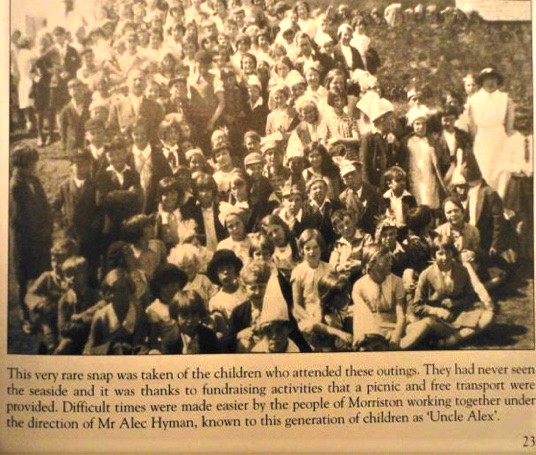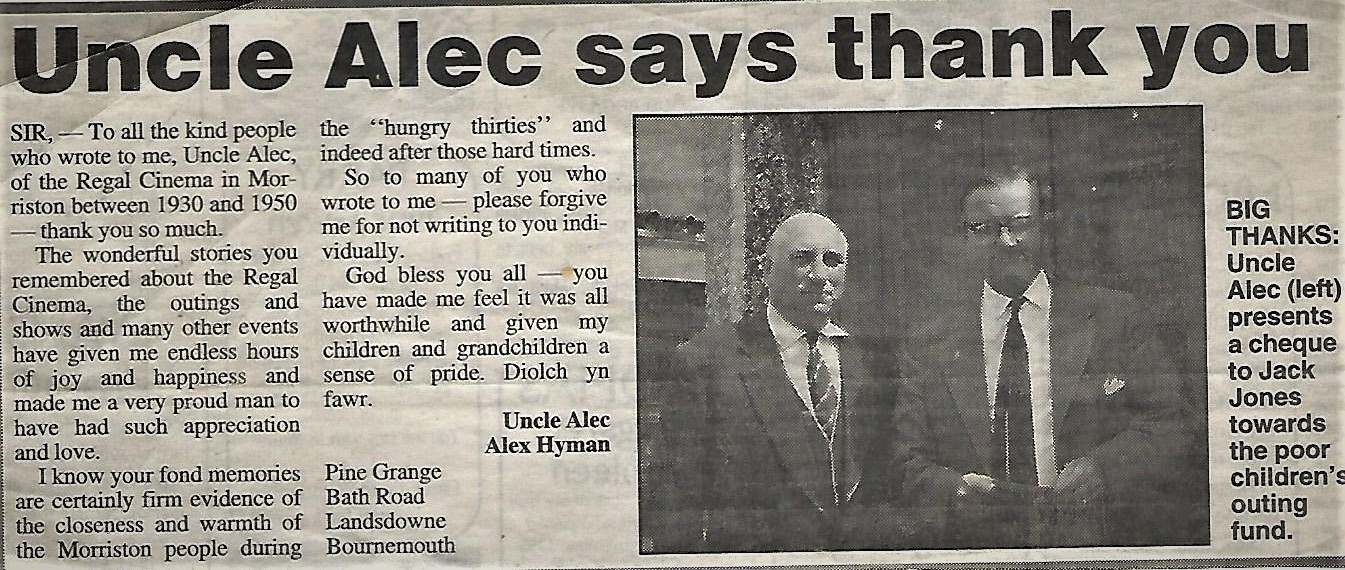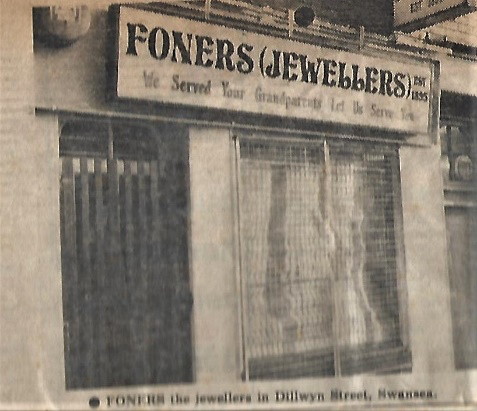Alex remembers as a small child that he felt ashamed when his mother came to school in Swansea with his packed jam sandwich lunch, which he had forgotten, dressed in a long black skirt and shawl, speaking Yiddish and broken English. He regretted this reaction in later years. He also related how once he was hailed from across the street by Pearl who was walking with Ray and Esther in tow – he told his friends it was the cleaner and her two children! As a boy, Alex recalled attending the boys-only National School, from about age 7, then Terrace Road school, following his siblings. Although on a day to day basis the death of his mother in 1919 had relatively little impact on him, it had major consequences for his schooling.
Louis may have run out of whatever steam he had, when it came to paying his children much attention, and Alex, aged about 11, with his sister Ray, was sent to board at the Townley Castle School, Ramsgate, where the pupils were largely children of foreign-born immigrants who wished for a bit of English polish to be bestowed on their offspring. He recalled travelling up by train escorted by their lodger, Ms Rae Berg, who took them to Selfridges to be outfitted, and bought them each a gold watch on account, for which they got into trouble later on. After a couple of years they came home, having been miserable. Louis certainly didn’t spend money on expensive education past a certain age, and none of the children had any professional or university training. Alex recalled that the boys’ barmitzvahs were really only celebrated by the adults, and that a gift of some ‘gelt’ (money) was given, after the portion reading in the shul, but there were no parties or celebrations for the young folk. Louis had his friends around for a game of cards that night. Alex’s barmitzvah was at Goat Street synagogue. In 1922, 3 years after the death of his mother Louis married Tilly Taylor. Alex left school at the age of 14 years and became a partner with Eric Glick selling electric lamps. Louis then gave £300 to Tilly’s brother Philip Lipman to take on Alex as an apprentice upholsterer in London. He hated it but had to obey his father, who had also paid for digs in Hackney. He quit as soon as possible, going to live with his sister Pearl in Liverpool.
By 1927, Walter, who was managing the cinemas, persuaded Alex to leave Liverpool, where he had been working as an upholsterer, and return to Swansea to help him in the cinema business. One of his first jobs was to cover 1000 seats at the Landore Cinema (4kms from Swansea). In 1932 Walter appointed him under- manager at the new Regal cinema in Morriston (6kms from Swansea). This job suited Alex’s personality very well. The cinema had a capacity of 2000 seats and Alex brought many famous film stars and sports personalities to the cinema. Alex soon became very popular and a well- known personality amongst the local population in Morriston. During this time Britain was going into an economic depression and Alex, affectionately known as “Uncle Alec” organized special Saturday morning matinees, competitions and trips to the beach in the Gower peninsular nearby for the underprivileged children. This was a huge and worthy enterprise and left a long legacy of gratitude.

Cutting from local paper about the outings in the 1930's
This period of Alex’s involvement with the cinema and the many characters he interacted with was a highpoint of his life, and he had many tales of the goings on around the Movie world as it was then. In the 1990’s, Alex's grand-daughter, Gigi, researched his involvement with the Morriston community in the 1930s. As a result of of a letter to the South Wales Evening Post asking for information, many letters referring to this period were received. Those children never forgot him as can be seen in these letters he received, As a young man, together with his friends, Alex had joined the Territorial Army (see picture below with Alex on R). As as result he was one of the first to be conscripted into the regular army in 1939.

In 1938, he had married his second cousin Charlotte (Lottie) Stoops from Liverpool. She was 6 years younger than Alex, a smart dresser, with blond hair and blue eyes and had helped her father Mottice, in his wine shop. She also had a good knowledge of running an Orthodox Jewish home.
After Alex had left for the army, Walter expected Lottie to help in the cinema in Morriston near Swansea. Meanwhile, Jennifer was born in 1940 and life became very difficult. Eventually, Lottie found lodgings in Hoylake in the Wirral so she could be near her family in Liverpool. As the War continued, Alex became very conscious of his German sounding surname Schechter and in 1942, went to a lawyer and officially had it changed by deed poll to Hyman. As he wrote to Lottie “G-d forbid, I should get captured by the enemy with a German sounding name. It would be G-d help me”! Later on, Sergeant Hyman was transferred to a Coastal and Searchlight Regiment. His children remember him telling stories as to how he was able to recognize and identify German bombers by their sound and so was able to forewarn the high command where they could expect to be bombed. In June, 1945, towards the end of the War, he took part in the liberation of Jersey and came into contact with German Prisoners of War ( See below Alex searching German prisoners). He was finally demobbed on 4 October, 1945.
After the war, Alex opened a second-hand furniture shop, which was followed by a “Do-it Yourself” hardware shop and then, in the early sixties, he was persuaded by his brother-in-law, Myer Stoops, to move to Liverpool and join him in his wholesale drapery business in Liverpool. Alex did not enjoy this experience and after about a year returned with his family to his beloved Swansea, where he took over Foner's jewelry business.

Alex, like his father, was always looking for new deals. His son Maurice remembers how once he came home to announce that he had just supplied rubbish bins to the local council for the whole of the town. On another occasion, when he took an interest in selling off some coal from an open cast mine, his brother Maurice suddenly arrived from America, having heard that Alex had a gold mine! He was very popular, a great story teller and Lottie tried hard to control his enthusiasm and generosity. They were both active in Jewish and non-Jewish charities, with Lottie eventually becoming Life President in the Woman’s Branch of the Morriston British Legion, Chairman of Swansea Wizo and later the Synagogue Guild, whilst Alex became Chairman of Swansea B'nai Brith, A.J.E.X and also joined Glantawe Lodge of Freemasons. From the 1970’s the Swansea Jewish Community started to decline, as many of the younger generation moved to the bigger centres to pursue their careers and settle in larger Jewish communities. Therefore, in 1981, Alex and Lottie happily retired to Bournemouth on the South Coast. >>>

